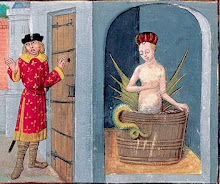It’s funny, the things that come out of nowhere and punch you in the gut. This time it was one of those modified pictures that make the rounds on FaceBook that I’m fairly certain are supposed to be funny. Edmund Blair-Leighton’s painting The Accolade—you know, the Pre-Raphaelite queen in the white dress knighting the handsome young man. The added caption was “Not every girl likes chivalry. Just the ones worth dying for.”
So here’s the thing. Somewhere along the way, people started thinking that “chivalry” and “courtesy” are the same thing. They’re not. Holding the door for the person behind you, regardless of your respective gender presentations is courtesy. Offering your seat on the bus to the person with their arms full is courteous, regardless of whether they’re wearing heels and a skirt. If you are a dude and you hold the door for women but not for men, you aren’t chivalrous, you’re just a douchebag. And if you get to the door first and the woman behind you has her hands full but you don’t hold the door because, hey feminism, well then you’re just an asshole.
Because let’s be clear what we’re talking about when we talk about chivalry. As much as modern chivalry advocates would have us believe that chivalry and courtesy are the same, chivalry is a system in which women of a certain social class agree to sacrifice autonomy and their status as human beings so that men of the same social class will protect them as valuable property from other men who may want to damage said property. A system where men of noble rank were free to rape peasant women, because courtesy was wasted on such a woman who couldn’t feel love. A system where as long as a man was unfaithful only with his libido, not his heart, it was all good, but a woman who committed adultery could be killed for dishonoring herself and her family.
If you are woman of a lower social class, you are fair game.
If you are not appropriately meek and virtuous, you are fair game.
If you slip from your pedestal and demonstrate any human flaw, you fall down here with the rest of the bitches and whores. You are fair game.
I struggle with femininity. I love makeup and always have. I love sparkles and flowers and mermaids and rainbows, and always have. I enjoy “girl-drag” from time to time—the trappings of traditional femininity.
But to be feminine in our culture is to be incompetent. It is to throw like a girl. It is to cry like a little girl. It is to be delicate. Sexy, but not sexual. Smart, but not too smart. Quiet. Submissive. I am none of these things. I laugh too loud at raunchy jokes. I am smart and I don’t hide it. I like sex. I don’t stroke egos. I try to be kind, but I do not submit. I’ve been on the pedestal, and the price was too high. There’s no wiggle room, no room for the inevitable failure. I am not a goddess. I am not La Belle Dame Sans Merci. I am not the pure, virtuous ideal. I am a human woman with human flaws and human passions.
So when I read that—just the ones worth dying for—600 years of chivalry’s baggage hit me like a sleeper wave. 600 years’ worth of messages telling me to be desirable but unattainable, of my honor being reduced to what’s between my legs, of my worth being determined by how closely I can live up to the ideal—how well I balance on the pedestal. I was reminded that as a flawed person, I am nothing but a bitch and a whore, certainly not a goddess worth dying for.
This is chivalry’s legacy. It is a world where an 11 year old girl is blamed for her own gang-rape because she is seen as low-class. It is men who scream epithets at women who have the gall to refuse them, however politely, because their honor has been insulted. It is women who slut-shame, thinking that their virtue will keep them safe. Chivalry can’t die fast enough, as far as I’m concerned. If that makes me not worth dying for, so be it. The women in chivalric romances who are worth dying for all come to depressing ends—both the cause and the victims of death and tragedy. I have no interest in the simple joys of maidenhood. Worth dying for? Screw that. I’d rather be worth living for.
Friday, January 27, 2012
Subscribe to:
Comments (Atom)

